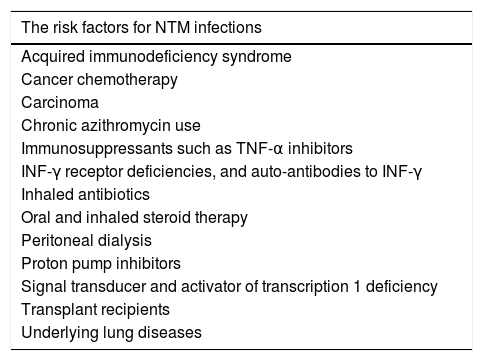I read with great interest the article by Jacob et al., entitled “The effect of alcohol consumption in the treatment of nontuberculous mycobacteria.”1 Little is known about the relationship between alcohol consumption and nontuberculous mycobacterial (NTM) infections, and the result of this article will add insights into the exacerbating factors for this disease. However, it seems early to decide that alcohol consumption is a risk factor for worsening NTM infections.
This study did not refer to some important risk factors for developing NTM infections: the use of immunosuppressants, and the history of solid organ or hematopoietic stem cell transplantations (Table 1).2,3 Besides, it seems crucial to refer to the history of liver diseases. Although cirrhosis is not an established risk factor for developing NTM infections, the liver function is important in selecting the treatment regimen because of the hepatic toxicity of rifampicin and isoniazid.3
The classic factors for developing and worsening NTM infections; NTM: nontuberculous mycobacterial; TNF-α: tumor necrosis factor alpha; INF-γ: interferon gamma.
| The risk factors for NTM infections |
|---|
| Acquired immunodeficiency syndrome |
| Cancer chemotherapy |
| Carcinoma |
| Chronic azithromycin use |
| Immunosuppressants such as TNF-α inhibitors |
| INF-γ receptor deficiencies, and auto-antibodies to INF-γ |
| Inhaled antibiotics |
| Oral and inhaled steroid therapy |
| Peritoneal dialysis |
| Proton pump inhibitors |
| Signal transducer and activator of transcription 1 deficiency |
| Transplant recipients |
| Underlying lung diseases |
The factors I mentioned above were not included in the analysis in the article by Jacob et al. So, it seems premature to think that alcohol consumption is the risk factor for worsening NTM infections.
Authors contributionConceptualization, manuscript writing: Hiroshi Ito.
Final approval of manuscript: all authors.
FundingNone declared.
Conflicts of interestThe authors have no conflicts of interest to declare.
The author is grateful to the members of the Division of Hospital Medicine, University of Tsukuba Hospital for the support of daily clinical practices.








